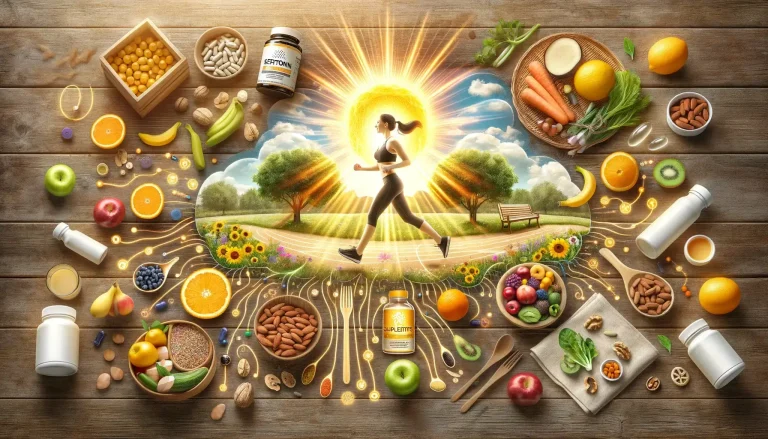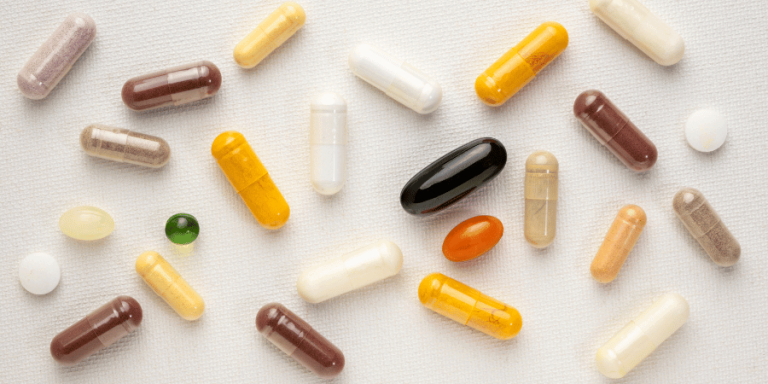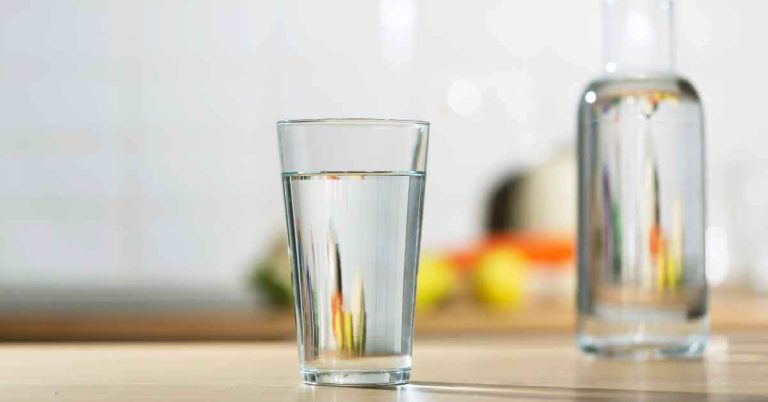Serotonin, a key player in the symphony of our body’s functions, is more than just a chemical; it’s a bridge between our internal health and the external world.
Synthesized from the humble amino acid tryptophan, and found in the simple pleasures of foods like bananas and turkey, serotonin holds the key to our mood, stability, and overall well-being.
However, the journey to achieving the perfect serotonin balance is a tightrope walk—a deficiency could plunge us into the depths of mental health challenges, while an excess might trigger the daunting serotonin syndrome.
This article will uncover the natural ways to gently nudge your serotonin levels to the sweet spot, through the healing power of sunlight, the exhilaration of a good workout, and the simple joy of a well-curated meal, all evidenced by the backing of recent scientific literature.
What is Serotonin and Why is it Important?
Serotonin, scientifically known as 5-hydroxytryptamine (5-HT), is a critical neurotransmitter that plays a significant role in various bodily functions and psychological well-being. It is primarily located in three areas of the body: the central Nervous System (CNS), Gastrointestinal Tract, and Blood Platelets. Each area plays a unique role in health and disease.
Serotonin can not be made by the body, rather, it must be synthesized from the essential amino acid tryptophan, which is orally ingested and found in foods such as bananas, pineapples, plums, turkey, and milk.
Serotonin plays a crucial role in both physiological and psychological functions, acting as a key neurotransmitter influencing everything from mood regulation to digestive health. Its importance lies in its ability to stabilize mood, making individuals feel calm, positive, and emotionally stable.
A deficiency of serotonin has been shown to increase the risk of mental health disorders such as depression, anxiety, panic attacks, obsessive-compulsive disorder (OCD), and post-traumatic stress disorder (PTSD).
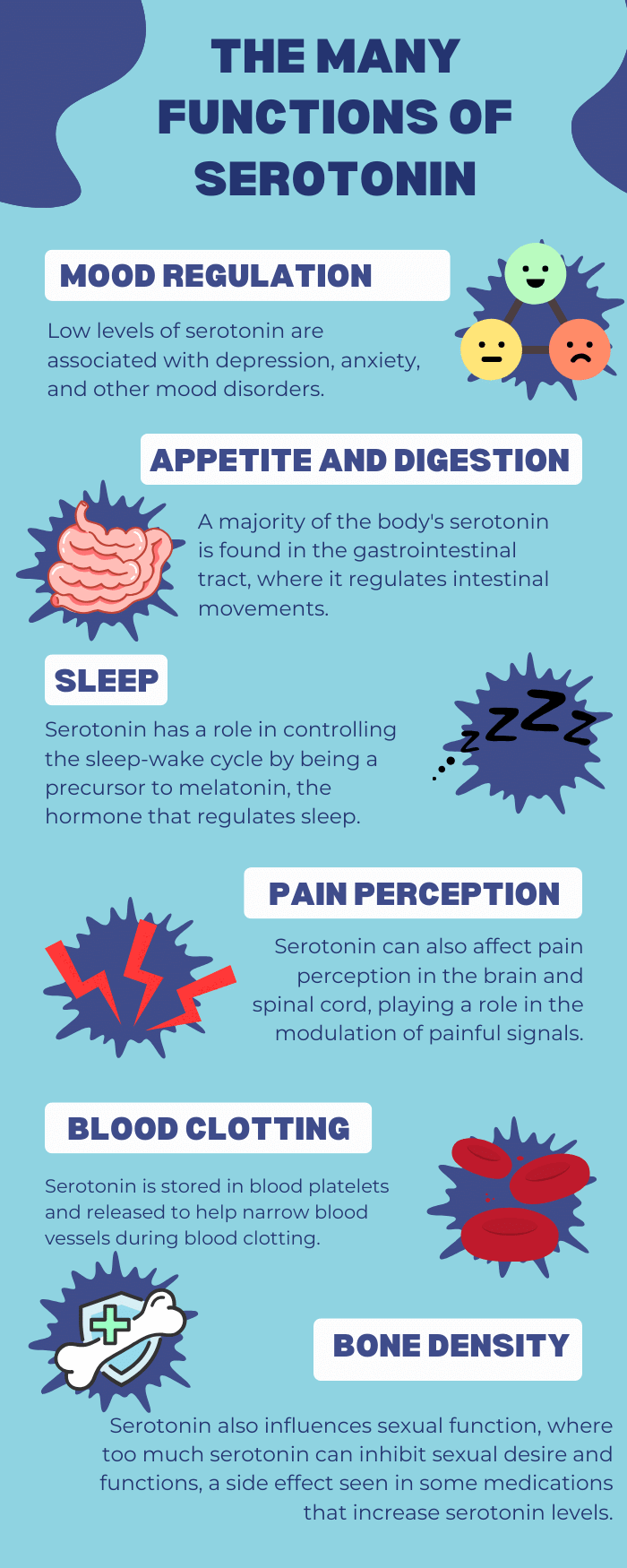
Serotonin Syndrome – The Dangers of Too Much Serotonin
To combat mental and physical health afflictions caused by a deficiency of serotonin, medication, such as Selective Serotonin Reuptake Inhibitors (SSRIs), are commonly prescribed as a way to boost serotonin and rebalance normal levels.
Unfortunately, whether through medication or other means, it is possible to increase serotonin levels too much, leading to serotonin syndrome, a potentially life-threatening condition caused by an excess of serotonin in the brain.
As a result, mild serotonin deficiencies have turned toward natural ways of increasing serotonin, without the risk of medication that only has an effect in around 50% of users.
How to Increase Serotonin Naturally
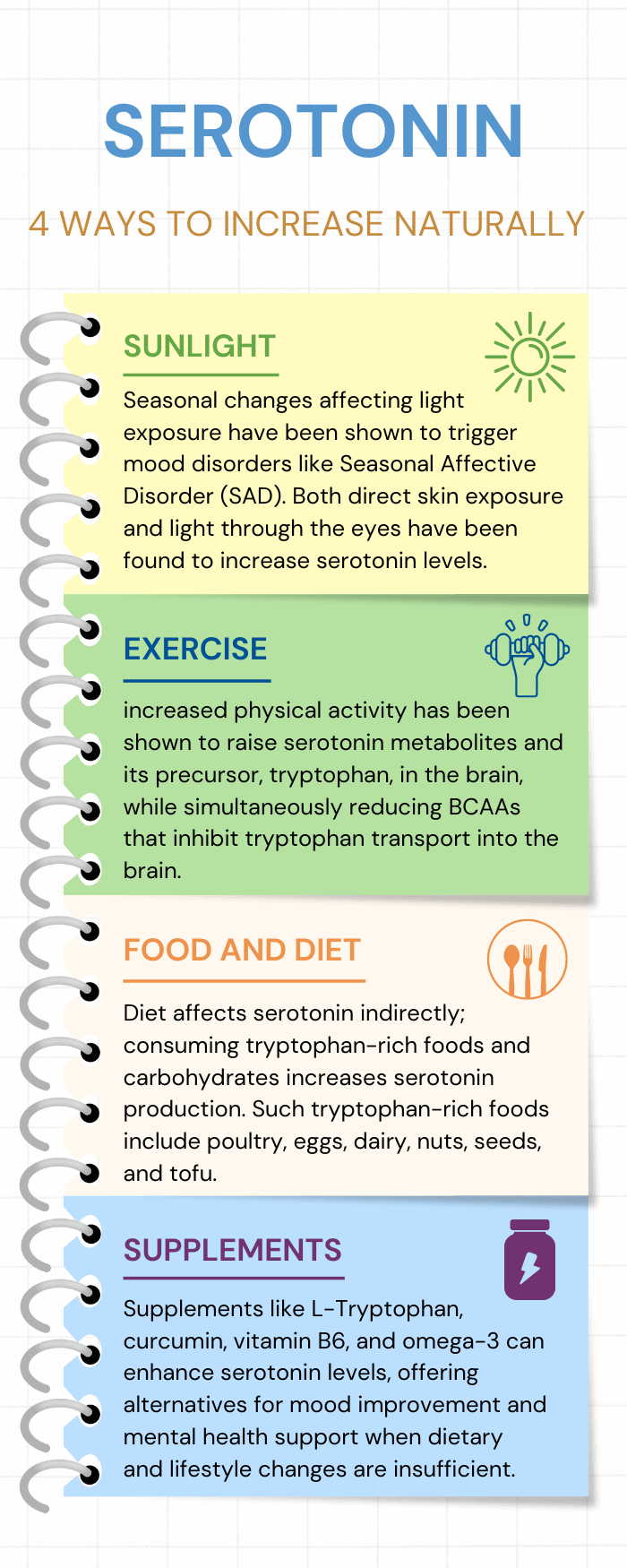
1) Exposure to Sunlight
Around 5% of the population experience a change in mood by shorter daylight hours and less sunlight in winter, a condition known as Seasonal Affective Disorder (SAD), typically lasting for 40% of the year.
In fact, the condition is so prevalent that the Diagnostic and Statistical Manual of Mental Disorders, Fifth Edition (DSM-V) acknowledges the potential for seasonal effects in depressive disorder.
While the exact reasons behind the worsening of psychological disorders with seasonal changes are not fully understood, existing research suggests a probable link between sunlight exposure and serotonin levels.
One plausible mechanism for this is the effects of sunlight via the retina to the central nervous system. More recent research, however, has identified the skin as an additional means of modulating serotonin.
Human skin has an inherent serotonergic system that appears capable of generating serotonin. This study showed that participants exposed to light without UV-A rays (which affects the eyes’ connection to brain serotonin levels), and those exposed to light had higher serotonin levels than those who weren’t.
The findings suggest that our skin might directly help control serotonin levels in response to light, adding another layer to how we understand the effects of light on our mood and serotonin levels. This doesn’t rule out other pathways like the eye-brain connection but highlights the skin’s potential role in this process.
A Finnish study on nearly 6,000 individuals found that 85% of participants reported seasonal variations in mood, characterized by more intense symptoms in the winter months compared to the summer months.
A more detailed study expanded upon this finding and sampled jugular blood from 101 healthy male volunteers, one sample each during 12 months, and determined that serotonin levels were lowest in the winter.
Most studies collectively suggest that normal adults exhibit elevated serotonin levels in the late summer and fall and reduced serotonin levels in the spring—likely in relationship to available sunlight.
Given these normal variations, it may be that individuals who are susceptible to seasonal effects are especially sensitive to these changes in the presence of psychopathology.
It has even been postulated that our skin’s ability to make serotonin might come from an old system that existed before our bodies evolved their current form. It also suggests how our skin might play a role in how our serotonin levels change with the seasons while possibly explaining why we like sunbathing.
There are also more direct relationships with sunlight, such as boosting vitamin D3 production that faciliate better metabolic health and mood.
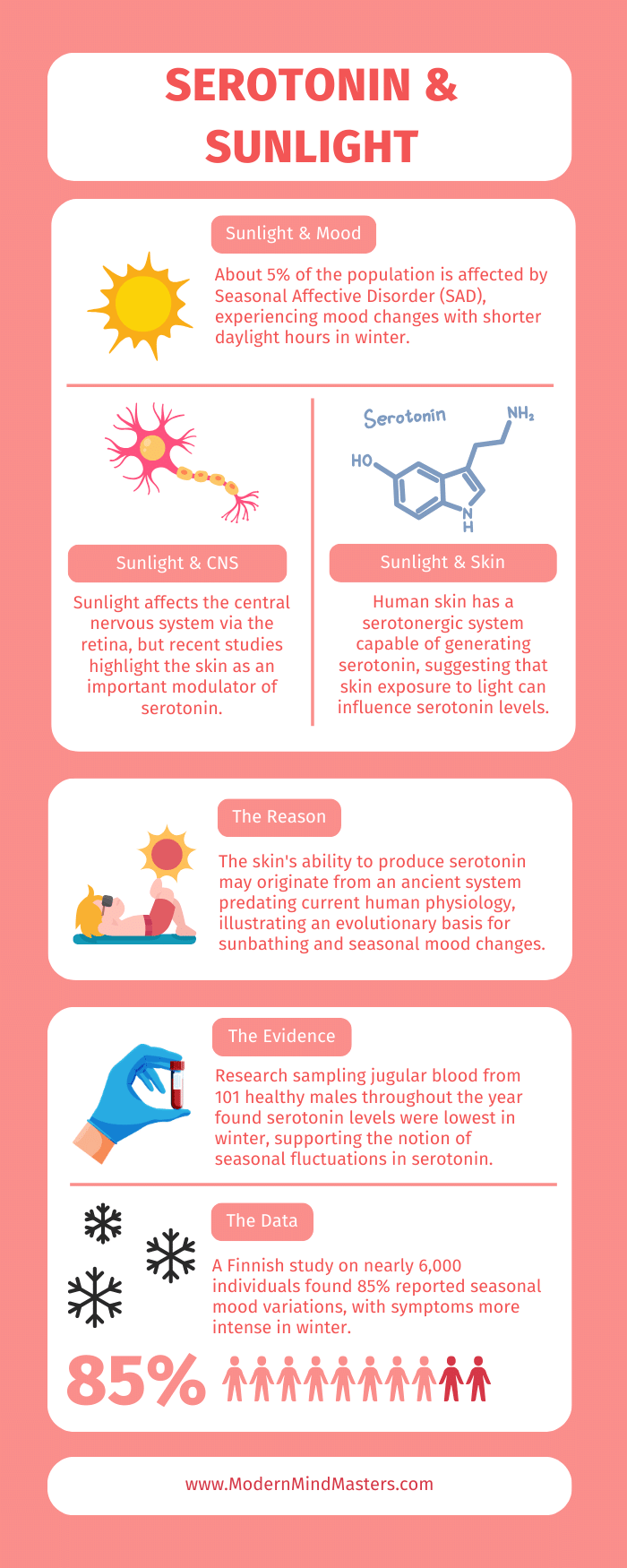
2) Exercise to Elevate Serotonin
The anxiolytic (anti-anxiety) effects of exercise have long been acknowledged in the scientific literature; in the United Kingdom, the National Institute for Health and Clinical Excellence recommends treating mild clinical depression with various strategies, including exercise rather than antidepressants, because the risk–benefit ratio is poor for antidepressant use in patients with mild depression.
The serotonergic system is likely involved to some degree with this effect.
This study explored the impact of increased physical activity on patients with depression, aiming to mimic the effects of mania. Specifically, the study measured levels of biogenic amine metabolites (products of the breakdown of certain neurotransmitters) in the cerebrospinal fluid (CSF) of these patients both before and after they intensified their physical activity.
One of the key findings was an increase in the levels of 5-HIAA, a metabolite of serotonin, in the CSF following heightened physical activity.
More recent studies have shown increases in extracellular serotonin in various brain areas, including the hippocampus and cortex, after exercise.
In addition to an increase in the brain of the serotonin precursor tryptophan that persists after exercise, motor activity (goal-orientated activity) was found to increase the firing rate of serotonin neurons, thereby increasing the release and production of serotonin.
Numerous studies indicate that engaging in physical activity, up to the point of exhaustion, is linked with a rise in the level of tryptophan in the blood and a reduction in the blood concentrations of branched-chain amino acids (BCAAs) that inhibit tryptophan transport into the brain.
3) Food and Diet for Serotonin
The relationship between the brain and the gut may seem distinct, but the two are remarkably intertwined.
There are two main ways our brain controls eating: one is about balancing the energy we use with the energy we get from food, and the other is about how eating makes us feel good and motivated. Serotonin helps in both ways. It helps our body recognize when we’ve eaten enough to meet our energy needs, so we stop eating, while also helping to reduce the urge to eat just because it feels rewarding or enjoyable.
The brain-gut axis is a two-way communication system, connecting the brain’s emotional and thinking areas with the control and operation of the digestive system. Serotonin is a key element of this brain-gut axis.
While it would make sense that eating more foods that contain serotonin would increase serotonin levels, it is, unfortunately, not that simple.
The widespread belief, often seen on social media, that eating high-protein foods like turkey can increase brain tryptophan and serotonin levels is, unfortunately, incorrect. Similarly, the common myth that bananas boost mood due to their serotonin content is misleading.
While bananas do contain serotonin, as do other foods including cheese, meat, fruits, and vegetables, it is not easily accessible to the CNS due to the blood-brain barrier.
Instead, we need to focus on the precursor to serotonin, tryptophan, which can cross the blood-brain barrier (BBB) and is essential for serotonin synthesis in the brain, made more efficient when combined with pyridoxal phosphate (PLP), a coenzyme derived from vitamin B6 found in the diet.
Therefore, both tryptophan and vitamin B6 are critical for the production of serotonin and other neurotransmitters in the brain, which are key to achieving antidepressant effects in various clinical conditions.
Vitamin B6 is crucial for the synthesis of several important neurotransmitters in the brain, including serotonin (5-HT), melatonin (N-acetyl serotonin), norepinephrine, and dopamine. Being water-soluble and not stored in the body, vitamin B6 needs to be replenished daily.
While supplements are an option, the body generally absorbs vitamins more efficiently from food sources. Foods rich in vitamin B6 include poultry, tuna, salmon, shrimp, beef liver, dairy products such as milk and cheese, and lentils, making them vital for maintaining adequate levels of this vitamin and supporting neurotransmitter production in the brain.
The release of serotonin by neurons in the central nervous system is largely influenced by diet: the consumption of carbohydrates, through insulin secretion, and the effect on the “plasma tryptophan ratio,” leads to an increase in serotonin release, while protein consumption does not have this effect.
This is often at odds with what we consider a “healthy” diet, higher in protein and lower in carbohydrates. It is also why many individuals with obesity often consume high-carbohydrate foods (like snack foods, pizza, hamburgers, potato fries/chips, or pastries, which are also high in fats) to enhance their mood.
Although we cannot increase serotonin levels directly by eating serotonin-rich foods, we can increase it indirectly by increasing tryptophan-rich foods to increase the availability of this amino acid for serotonin production in the brain.
Such tryptophan-rich foods include poultry, eggs, dairy, nuts, seeds, and tofu. Healthy carbohydrates such as whole grains, fruits, and vegetables can also lead to an increase in insulin levels, which in turn helps clear other amino acids from the blood but leaves tryptophan relatively untouched.
A well-balanced diet that supports gut health can also influence serotonin levels, given the significant role of the gut in neurotransmitter production. Approximately 90% of the body’s serotonin is produced in the digestive tract, and while this serotonin does not directly affect the brain, a healthy gut can contribute to overall well-being and potentially impact brain health and mood indirectly.
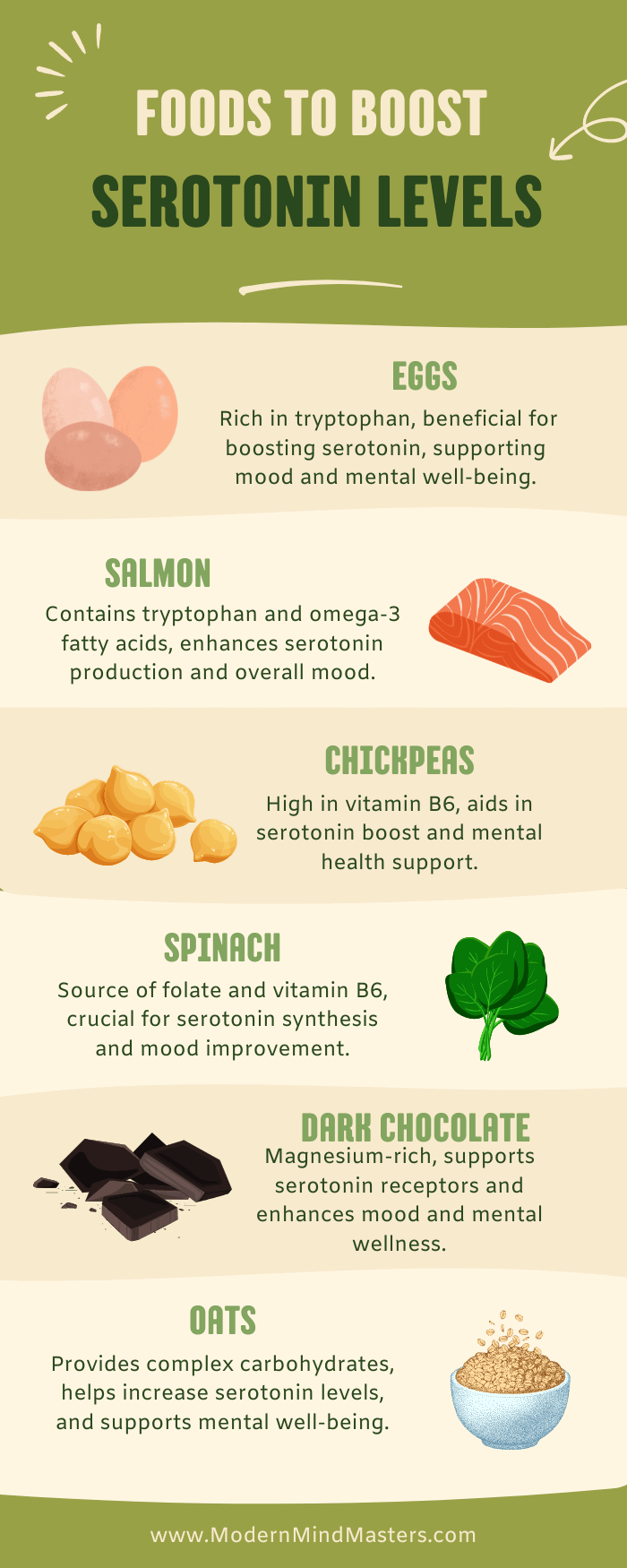
4) Supplements for Increasing Serotonin
While it is generally better to get nutrients from food rather than supplements for several reasons, such as better nutrient absorption and the synergistic effect of other beneficial compounds found in food, supplements can help to quickly counter specific nutrient deficiencies that are hard to correct through diet alone.
L-Tryptophan

After ingestion, L-tryptophan is absorbed and transported to the brain, where it can be converted into 5-hydroxytryptophan (5-HTP), and then into serotonin. This process is facilitated by the presence of certain co-factors, such as vitamin B6.
Four RCTs have shown the effects of tryptophan intake on negative feelings and happy feelings in healthy individuals, with significant differences between the treatment and the control groups, suggesting that tryptophan intake may be an effective approach to decrease anxiety and increase positive mood in healthy individuals.
The study concluded that taking 0.14-3 g of tryptophan per day in addition to the usual meal can be expected to improve the mood of healthy individuals.
Curcumin
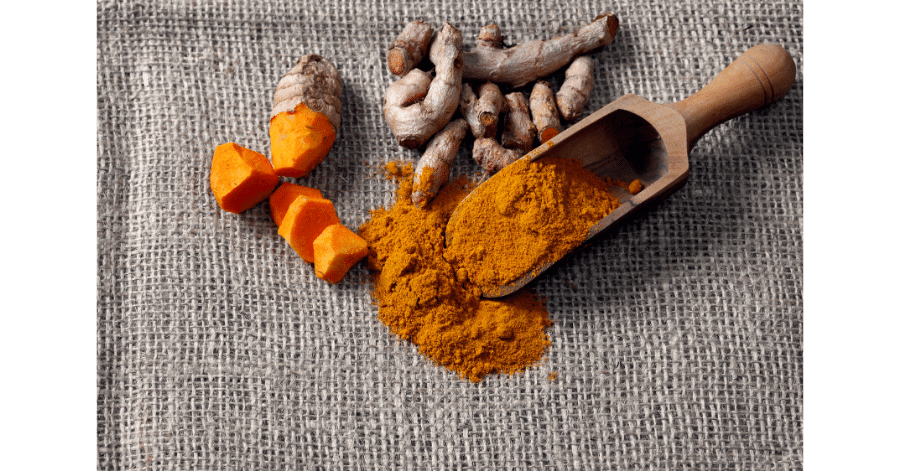
Curcumin, a compound found in turmeric, has been demonstrated to boost levels of dopamine and serotonin in the brain, indicating it could improve serotonergic neurotransmission and have antidepressant properties. Research involving mice showed that curcumin administration resulted in elevated serotonin and dopamine levels in the brain, while levels of norepinephrine remained unchanged.
Further studies revealed that when curcumin was combined with different antidepressant drugs, there was an additional increase in brain serotonin levels, suggesting that the antidepressant effects of curcumin are mainly due to its impact on serotonergic neurotransmission.
Unfortunately, curcumin is poorly soluble in water, which contributes to its low bioavailability—meaning a significant portion of what is ingested is not absorbed and cannot exert its beneficial effects.
Combining curcumin supplements with piperine, a compound found in black pepper, or fats, such as with a fatty meal, can improve its absorption tremendously. Studies suggest that combining curcumin with piperine can increase curcumin’s bioavailability by 2000%, which is why many curcumin supplements include piperine.
Folic acid (Vitamin B9)
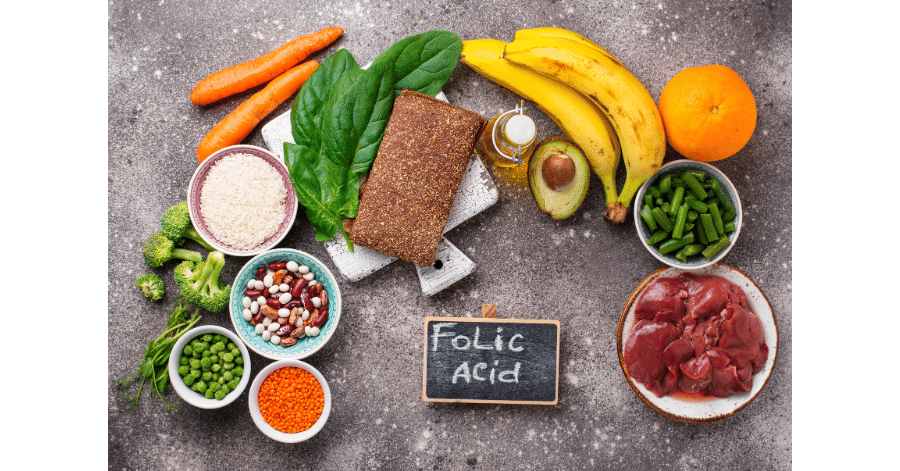
Taking folic acid (vitamin B9) supplements has been found to normalize levels of serotonin metabolites in people with a folate deficiency associated with neuropsychiatric disorders, underscoring the vital role of folic acid in regulating serotonin metabolism.
While not every study found this link, many have observed that individuals with neuropsychiatric conditions and a folate deficiency often have lower levels of 5-hydroxyindoleacetic acid (5-HIAA), a substance produced when serotonin breaks down, in their cerebrospinal fluid (CSF). Nonetheless, research indicates that supplementing with folate can bring these serotonin metabolite levels back to normal.
This study recommended folate supplementation at 2 mg be given during the acute, continuation, and maintenance treatment of depression, although 1 mg may suffice.
St. John’s Wort

One of the main mechanisms used in health care is the report that St. John’s Wort acts as a reuptake inhibitor of serotonin, dopamine, and norepinephrine, working to reduce the uptake of serotonin at neuronal synapses, as well as dopamine and norepinephrine.
St. John’s wort has been shown to treat major depression in a manner superior to that of a placebo antidepressant. It has even been shown some promise for its effects on OCD, as its current mechanism of action is comparable to today’s SSRI therapies, although studies are limited at this time.
It is prepared by grinding the flowers of the plant and its dried leaves, which can be used in tea and ingested orally or be made into oil by infusion for topical use. It is also common to find the ground plant in capsules taken as a dietary supplement.
Omega-3 fatty acids
Recent studies have demonstrated the usefulness of omega-3 in elevating serotonin levels, and it has been shown that taking omega-3 alongside other antidepressants may not be harmful.
One study suggested that combining omega-3 fatty acids with a selective serotonin uptake inhibitor may be beneficial for treating depression at the beginning, and a subsequent experiment found a trend favoring omega-3 supplementation over a placebo in terms of lowering depressed symptoms.
Omega-3 is easily found in capsule form, although it is readily abundant and more easily absorbed in foods such as fish, flax seeds, chia seeds, nuts, eggs, and grass-fed meats.
Vitamin B6
Not to be confused with vitamin B9 (folic acid), high dosages of vitamin B6 supplementation have recently been shown to significantly reduce feelings of stress, anxiety, and depression. This study found that after monitoring the effects of an elevated dose of vitamin B6 on young adults for more than a month, the participants reported feeling less anxious.
Vitamin B6 has a significant and selective modulatory impact on central serotonin and Gamma-aminobutyric acid GABA production (GABA is a chemical messenger and inhibitory neurotransmitter found in the brain). It helps calm the nervous system by blocking certain impulses between nerve cells, immediately slowing down brain activity and reducing the effects of anxiety.
Conclusion
Understanding how to naturally increase serotonin levels highlights a pivotal strategy for enhancing mental health and overall well-being without the risks associated with pharmaceutical interventions.
One must be careful with elevating serotonin levels, however; too much of a good thing can be bad, and when serotonin levels are raised too much, serotonin syndrome, a potentially life-threatening condition caused by an excess of serotonin in the brain, can occur.
From leveraging the mood-lifting powers of sunlight and engaging in regular physical activity to adopting a diet rich in tryptophan and critical vitamins, these natural methods underscore the interconnectedness of lifestyle, diet, and mental health, without the potential side effects of medications.
The thoughtful use of supplements such as L-tryptophan, curcumin, omega-3 fatty acids, and vitamins B6 and B9 can offer additional support for those seeking to optimize their serotonin levels.
As scientists navigate the complexities of mental health, the synthesis of these approaches provides a holistic path toward mitigating the risks of conditions like depression and Seasonal Affective Disorder (SAD), offering a brighter outlook for those affected.
In the future, genetic research will make it possible to predict with increasing accuracy who will be susceptible to depression. Until then, head outside, soak up whatever sun you can go for a run, and eat well. As all of these contribute to good health more broadly, you have nothing to lose.
FAQs
How to increase serotonin naturally?
Serotonin levels can be increased naturally through exposure to sunlight, performing exercise, through tryptophan containing foods, and through supplementation.
What foods increase serotonin?
Tryptophan-rich foods include poultry, eggs, dairy, nuts, seeds, and tofu, can boost serotonin levels. Healthy carbohydrates such as whole grains, fruits, and vegetables can also lead to an increase in insulin levels, which in turn helps clear other amino acids from the blood but leaves tryptophan relatively untouched.
What are the best natural serotonin supplements
L-Tryptophan, curcumin, folic acid, omega-3 fatty acids, St John’s wort, and vitamin B6 have all been found to elevate serotonin levels.
